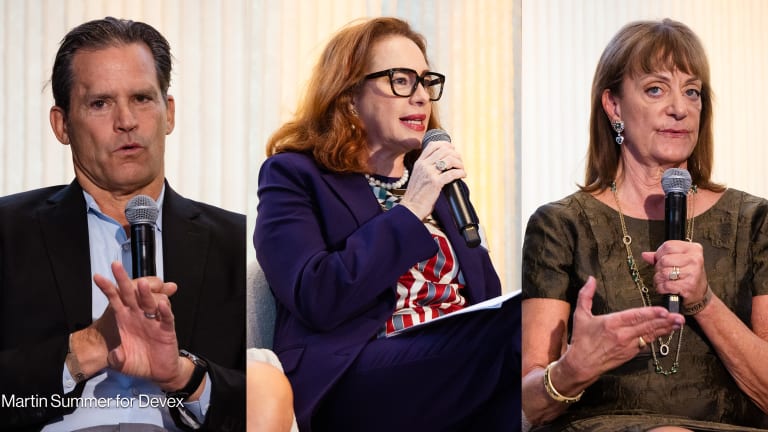
Bringing electricity to the 600 million people in sub-Saharan Africa still unable to rely on an adequate power supply is one of the defining challenges of the early 21st century. There is a new groundswell of commitment among development donors and corporate investors to solve the problem.
But until we acknowledge the critical role of African governments in catalyzing change and developing their own capacity to drive major infrastructure projects, Africans will continue to account for more than half of the people on the planet without power.
Energy is firmly at the top of the continents’ to-do list. Last week the U.S. Agency for International Development launched the Power Africa Roadmap, which sets out the strategy to meet President Barack Obama’s targets of delivering 30,000 megawatts of additional capacity and 60 million new connections.
Days earlier Akinwumi Adesina, president of the African Development Bank, announced a New Deal on Energy for Africa to help solve Africa’s energy deficit by 2025 by coordinating existing donors and scaling-up AfDB funds. These announcements, by two institutions able to leverage the assets of donors and the private sector and the clear commitment of their new leaders, clearly reflect the mood of the moment.
A new road map for Power Africa
An ambitious new road map released last week lays out how Power Africa, the U.S. government initiative to increase access to electricity in Africa, will achieve its targets by 2030. Here's a look what Power Africa has achieved and the path the road map paves ahead.
So, if we are reaching a tipping point of cash, commitment and moral cause, should we now expect to see substantial progress?
The challenge is that Africa doesn’t need more donor-funded feasibility studies for new generation plants or transmission lines that end up gathering dust in the drawers of an overstretched bureaucrat. Too many master plans conceived by foreign institutions fail to take into account the existing priorities, political constraints and electoral cycles of those governments that hold the key to success or failure.
Where the need to build shared commitment is overlooked, there is rarely a positive outcome. And even when there is, governments too often lack the capacity to translate plans into bankable projects that will attract private or public financing and come out of the ground.
For their commitments to translate into megawatts or connections, donors and private companies need efficient governments that can design the reforms required to create the right regulatory and economic environment. These governments also need to be able to prioritize and drive the delivery of the right projects. More than political will or money, the crux of the challenge for many African governments is that this requires expertise, know-how and experience often not currently held in key institutions.
When governments find a way to get things right major breakthroughs are possible. Look at South Africa — where a failing government initiative to promote renewable energy sources that hadn’t procured a single megawatt in almost three years completed 64 new projects in the next two. The officials in charge recognized their own capacity constraints and reached out across government to tap into expertise around public-private partnerships, paving the way to securing over $14 billion in investment that is set to bring more than 3,500 MW of renewable power online in the next few years.
Look too at Guinea — where President Alpha Condé made energy generation a clear priority of his first term in office. For five years he paid sustained attention to building capacity in key institutions across the country’s power sector, developing local talent and tapping into external expertise that focused on driving a few selected projects. By the end of his first term, the Kaleta Dam project was complete and set to double the country’s energy supply and the streets of Conakry were lit by renewable lights.
Or consider Rwanda — where a government-led review of power generation needs led to a revised and more realistic framework for meeting electricity demand and driving reform priorities. The review was the basis of a competitive procurement process that has seen interest to turn into real commitments — including East Africa’s largest solar power plant coming online in a matter of months.
Successes like this are still far too uncommon on a continent starved for electricity. Despite this, I am optimistic. Private companies and international actors are increasingly acknowledging, in words and in actions, the need to work with governments and to help governments be better partners — rather than work around or against them.
Under the Power Africa initiative, for instance, the Power Africa Senior Advisors Group brings together leaders from politics, development, business and industry to work alongside government. The role of the advisors is to help senior officials identify realistic ways of overcoming the daunting hurdles that lie between masterplans and power plants. Alongside this there is embedded support in key institutions to help build the capabilities of their teams to implement these solutions.
Access to energy must remain the policy zeitgeist until this job is done. As more and more people crowd into the spotlight to put forward their own bright ideas, it is easy to forget that the ability to make progress hinges on African governments’ capability to master the necessary reforms, to build effective partnerships and to drive delivery. Where they show the way, we should be prepared to follow.
Join the Devex community and access more in-depth analysis, breaking news and business advice — and a host of other services — on international development, humanitarian aid and global health.








